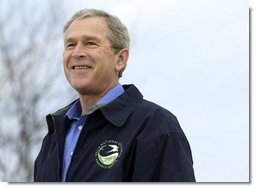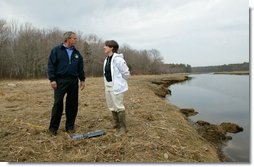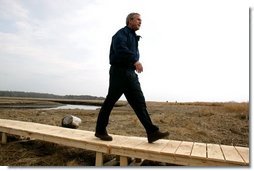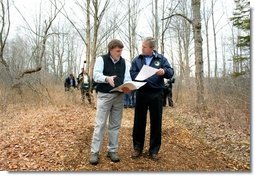
 |
For Immediate Release
Office of the Press Secretary
April 22, 2004
President Announces Wetlands Initiative on Earth Day
Wells National Estuarine Research Reserve
Wells, Maine
|
|||||
12:12 P.M. EDT
THE PRESIDENT: So great to be here, thanks. Gosh, my outlook improved dramatically the minute I stepped on this beautiful piece of land. Thanks for having me, and thanks for coming out to say hello. It's my honor to celebrate Earth Day with you in a state that I know pretty darn well, in a state that I love, in an area that I now realize I know well because it was right off the beach here that old Number 41 and I liked to try to catch striped bass. (Laughter.) It's a pretty good place to fish around here.
 Before I start going on too long about Mother Earth, I do want to
recognize my mother on Earth. Thanks for coming, Mom. (Applause.) I
hope you're up the road making my bed. (Laughter.)
Before I start going on too long about Mother Earth, I do want to
recognize my mother on Earth. Thanks for coming, Mom. (Applause.) I
hope you're up the road making my bed. (Laughter.)
Earth Day has become a great tradition in our country. It's a day that reminds us that we must be good stewards of the land around us. That's what this day says to us. And we're lucky to live in America, because we're blessed with such unbelievable lands. As the President, I'm fortunate to be able to travel and see a lot of our beautiful nation, whether it be from the -- from Maine to the Big Sur in California or parts of the great state of Texas that are beautiful to look at, too.
The importance about Earth Day is that it reminds us that we can't take the natural wonders for granted. That's what Earth Day says to me, and I hope it says to you, as well, that we have responsibilities to the natural world to conserve that which we have and to make it even better. That's the call for Earth Day.
In the years since Earth Day was established, America has made great strides in honoring the ideal of conservation and living by high standards of stewardship. We've made tremendous progress during the last four years. I have a responsibility as the President to put people in an administration that understands the importance of conserving our natural resources and making them better.
My administration has put in place some of the most important anti-pollution policies in a decade -- policies that have reduced harmful emissions, reclaimed brownfields, cut phosphorus releases into our rivers and streams. Since 2001, the condition of America's land, air and water has improved. (Applause.)
Today I want to talk about wetlands. The old policy of wetlands was to limit the loss of wetlands. Today I'm going to announce a new policy and a new goal for our country: Instead of just limiting our losses, we will expand the wetlands of America. (Applause.)
I appreciate Paul very much. He's a -- obviously a good manager. First of all, he loves what he does. He cares deeply about the mission. He's got such a joyous smile on his face that he must be an easy fellow to work with. And I want to thank him for his hospitality. He didn't even complain about the size of my entourage or the imposition that we must have imposed on Paul and his great staff.
 I also want to thank the staff for working hard to make sure this
slice of heaven is as beautiful as possible. I appreciate so very much
State Senator Paul Davis joining us today, Senator. (Applause.) Yes,
thanks for coming. I suspect there are some local officials who are
here. Thanks for being here. I like to remind local officials to make
sure that you empty the garbage and fill the potholes. (Laughter.)
I also want to thank the staff for working hard to make sure this
slice of heaven is as beautiful as possible. I appreciate so very much
State Senator Paul Davis joining us today, Senator. (Applause.) Yes,
thanks for coming. I suspect there are some local officials who are
here. Thanks for being here. I like to remind local officials to make
sure that you empty the garbage and fill the potholes. (Laughter.)
I had the honor of meeting Ray and Becky Davis at the airport. They're local citizens. The reason I bring up Ray and Becky is because they're the parents of three sons who have -- are now wearing the uniform of the United States Military. (Applause.) Sergeant Graham Davis, Marine Corps. (Applause.) Thank you, sir. Private First Class Stewart Davis who is now in Afghanistan. Make sure, Graham, that you -- (applause) -- make sure you tell your brother, Stewart, and brother Bradley, that the people not only applauded you, but they applauded them, as well. (Applause.)
I want to thank the Davis family for their steadfast support of working to secure this -- of raising sons who are working hard to secure this country. These have been tough times for America, but we're doing the right thing. We're spreading freedom and peace, so that our children can grow up in a peaceful world. (Applause.)
What's interesting about this year's Earth Day is that it falls in the middle of National Volunteer Week. This week we honor the 64 million Americans who volunteer. And one of my responsibilities is to call people to a higher calling. If you're not volunteering, do so. It will make somebody else's life better, including your own. (Applause.)
But what makes this beautiful part of the world go is the 400 volunteers who work here -- the 400 volunteers who are exercising their responsibility as citizens to make this beautiful part of the world even more beautiful and more meaningful.
 And so, first, I want to thank all the volunteers who have taken
time out of their life to make this such a special spot. Particularly,
I want to thank Frank and Carol Heller. I met Frank and Carol at the
airport when I landed here in Wells, in Sanford. And I gave them the
President's Volunteer Service Award. I did so because of their strong
commitment and work here, but I suspect they'll say they received the
award on behalf of the other 398 people who make this such a special
place. Thank you all for working hard here. (Applause.)
And so, first, I want to thank all the volunteers who have taken
time out of their life to make this such a special spot. Particularly,
I want to thank Frank and Carol Heller. I met Frank and Carol at the
airport when I landed here in Wells, in Sanford. And I gave them the
President's Volunteer Service Award. I did so because of their strong
commitment and work here, but I suspect they'll say they received the
award on behalf of the other 398 people who make this such a special
place. Thank you all for working hard here. (Applause.)
And I saw firsthand why you like to come. It's 1,600 acres of salt marshes and beaches and forests and freshwater wetlands. The Wells Reserve is an example of how committed people come together to not only protect, but to improve the environment. It's a good example of what I'm going to talk about here in a little bit.
Community and corporate partners, along with the federal government, are working on the Drakes Island marsh restoration -- community and corporate partners. In other words, in order to make sure the restoration works, it requires more than just government. It requires a buy-in by community partners. It requires a buy-in by corporate America. See, corporate America has a responsibility to the communities in which they live. They've got the responsibility to tell the truth when it comes to their balance sheets, and they've got the responsibility to contribute the quality of the communities in which they live. (Applause.)
The Laudholm Farm, where so much environmental education and research takes place, is supported by a private trust. You support the private trust in Kennebunkport, don't you, Mom? So do I. Ray Bradbury -- we've got Bradbury's Market. (Laughter.) The guy who owns it has put together a land conservation trust in Kennebunkport. We're proud supporters of it.
In other words, citizens can make a significant difference in improving the quality of the environment, just like those who have done so at the Laudholm Farm. And at the Little Estuary, I saw the volunteers working on platforms that allow students and researches to view the marsh, to understand the marsh, without harming the grasses or the shoreline.
There are good people working together for this reserve, for the sake of wildlife, for the sake of understanding and knowledge, and for the sake of future generations of people who are fortunate enough to come here. (Applause.)
 The work you're doing here to preserve wetlands is an important
part of a national commitment. For many years, our nation has been
working to prevent the net loss of wetlands. And there's a reason
why. America's wetlands are the habitat for thousands of species of
wildlife. Just hang out, out in these wetlands out here, and you know
what I'm talking about.
The work you're doing here to preserve wetlands is an important
part of a national commitment. For many years, our nation has been
working to prevent the net loss of wetlands. And there's a reason
why. America's wetlands are the habitat for thousands of species of
wildlife. Just hang out, out in these wetlands out here, and you know
what I'm talking about.
Up to half of all North American bird species nest or feed in wetlands. About half of all threatened and endangered species use wetlands. There's some endangered species using the wetlands right here on this piece of property. Our wetlands help to trap pollution. What I bet a lot of people don't understand is the wetlands help to clean the water, as well. They reduce the impact of floods. Wetlands stabilize shore areas. As well, wetlands provide recreational opportunities for guys like me who like to fish, and for people like my wife who like to watch birds.
Wetlands have been called the nurseries of life, and their well-being is vital to the health of our environment. Three decades ago, the United States was losing almost 500,000 acres of wetlands each year. Americans understood that couldn't be sustained, and so the nation began to take action. Every level of government, joined by landowners and conservationists, worked hard to turn the situation around. In other words, it took a collaborative effort of people who cared about the environment.
Our government began to provide substantial financial incentives for landowners to return farmland to wetlands. Taxpayer dollars have been matched by states and localities and conservation groups. It's the classic public-private partnership for the good of the environment.
Our national commitment to wetlands is showing good progress -- really better than good progress when you think about the fact that we were losing a half-a-million acres a year not so many years ago.
According to figures announced today by the Department of Agriculture, we have greatly reduced the annual loss of wetlands. And that's a positive development. We're nearing a long standing goal of actually restoring as many acres of wetlands that are lost. The figures show that on agricultural lands, we've seen some gains for the first time, which leads me to believe we can do a better job in the nation if we focus our attention.
 So today, I'm committing our government to a new policy. We will
move beyond the no net loss of wetlands in America to having an overall
increase of Americans' wetlands over the next five years. (Applause.)
So today, I'm committing our government to a new policy. We will
move beyond the no net loss of wetlands in America to having an overall
increase of Americans' wetlands over the next five years. (Applause.)
We can achieve this goal. It is a realistic goal. To do so, we will work to restore and to improve and to protect at least three million acres of wetlands over the next five years. First, we will restore at least -- we will restore at least one million acres of wetlands that do not exist today. Through expanded incentive and partnership measures, such as the Department of Ag's Wetland Reserve Program, and through the new grants under the Interior Department's North American Wetlands Conservation Act -- which, by the way, was signed by your husband, my dad. (Applause.)
Listen, there's a lot of things we can do through these programs. We can set streams back on their natural courses, allowing wetlands to return. We can provide incentives to our farmers and ranchers to stop cultivating areas that were once wetlands and make them wetlands again.
A good way to make sure we restore wetlands is to take those lands that were once wetlands and provide incentives to the landowners and say, here's an opportunity for you to contribute to the increase of wetlands in America for the good of the country, for the good of the habitat of our country, for the good of the wildlife of our country. All these efforts will add to the beauty of our nation and provide habitats for millions of birds and fish.
Second, we will improve the quality of another million acres of existing wetlands through expanded public-private efforts, such as the Interior Department's Partners for Fish and Wildlife Program. I know we've got some people from Fish and Wildlife here today. I want to thank you for serving you country so admirably. I appreciate your service. (Applause.)
As well, we will use NOAA's Coastal Wetlands Planning Protection and Restoration Program. I know we've also got NOAA representatives here, too. I thank you for coming. And thanks for your good work. (Applause.)
Too many wetlands are degraded and can no longer support healthy wildlife populations, so they need to be restored to health. In other words, they need to be nurtured; they were once wetlands areas, and they need to be nurtured back to be a wetland.
Tomorrow, I'm going down to Florida. I'll be seeing Brother. I'll be glad to give him your best. (Laughter.) And we're going to go to the Everglades. It's a great wetlands area. The problem is, is that the wetland -- the Everglades have been invaded by a -- by certain plant species, non-native plants, that are going to choke out the wetlands.
And so one of the things we're going to do is to encourage programs that will remove these invasive species so that native vegetation can return and the wetlands can be revitalized. In other words, we can restore wetlands so they function better, so they function as the Almighty wanted them to function in the first place. As they become healthier -- (applause.)
And finally, we will protect an additional one million acres of wetlands that are currently at risk by increasing grants for land protection programs and by making it easier for farmers and other landowners to participate in these programs. We'll encourage these landowners to place easements on their wetlands, on the wetland portion of their property, so that migratory birds can rest on their long journey. In other words, with proper government policy, we can encourage proper habits by private landowners to understand that they can do a better job with their land.
We'll do the ducks and other birds a good turn by not only improving the lands -- the wetlands, but also the lands near the wetlands. It's one thing to have a good wetland, but they've got to have a place for the ducks to nest, as well. And so the program is to -- is to be wise about the incentive programs we put in place. I'm confident these measures will be not only appreciated by people, but by birds. (Laughter.)
To meet the goal of wetland expansion, the government must commit money, and my administration is prepared to do so. The first thing we've done in the -- 2002, I signed the farm bill. And one of the most important aspects of the farm bill was the conservation titles. It was a significant expansion of federal money available to encourage people to expand areas of their farms and ranches, like wetlands.
And secondly, the budget I proposed -- or sent to Congress, proposes to spend $349 million on two key wetlands programs, which is an increase of more than 50 percent since I first took office. These monies will help. These monies will provide proper incentive for good conservation measures.
But the thing I think is very important to emphasize here is that good conservation and good stewardship will happen when people say, I'm just not going to rely upon the government to be the solution to the problem. (Applause.) I've come here because this is a great example of people seizing the initiative; a great example of where the government can help, but not stand in the way of common-sense policies that will make a significant difference to the wetlands and the native species. And it sends a clear signal to everybody else around our country that if you want to be a responsible citizen, do something about the quality of the life in the community in which you live. (Applause.)
It's my honor to come here today to celebrate this fantastic project; to remind our fellow citizens that we all have got responsibilities; to declare that the federal government has set a new, important goal of increasing the net -- the wetlands all across America; and to ask God's blessings on this beautiful part of the world and the people who live here.
Thank you all for coming. (Applause.)
END 12:33 P.M. EDT